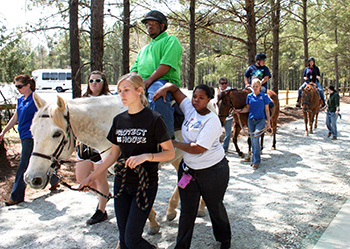
People who have raised or grown up around horses agree that they can be good teachers who offer humans valuable lessons about life and everyday living. Students in a special education class at Emerald High School in Greenwood are finding that out firsthand at Lander University's Equestrian Center, where their interaction with horses is helping them improve their life skills.
They are eight students in what's called a trainable mentally disabled class, and they have been visiting the Equestrian Center once a week since last fall. There, they have learned about horses and how to care for them, lessons that they can apply to their personal lives.
Beth Wood, Lander's Therapeutic Riding Program coordinator, and therapeutic riding instructor Melissa Palotta created the program, which they teach. It began with a six-week life skills horsemanship curriculum, which involved the students in activities not connected with riding. Wood said, "We taught them such things as identifying the parts of a horse, how to groom a horse, what they eat and other lessons they can relate to their own personal care, nutrition and life skills."
Their teacher at Emerald is Stacy White, a multigenerational special education teacher and a 2008 Lander graduate. White was so pleased with the students' response to the fall classes that she sought and received a grant from Knights of Columbus Council #7129, affiliated with Our Lady of Lourdes Catholic Church in Greenwood. The gift enabled the program to expand into the spring so her students could take part in therapeutic riding at the Lander center.
The spring class is split into two four-week sessions. While one group of four students learns how to ride a horse, the other group is engaged in a newly developed equine literature curriculum, listening to stories about horses then participating in activities related to the stories. When the program started, only one of the eight students had ever ridden a horse. Now, they all ride.
White said the sessions have boosted each student's self-confidence and social skills. They have learned how to interact and communicate, not only with each other but with the horses as they give them commands while riding and listen to directions from the instructors. She said communication and socialization are big issues with them. "Most of the students love animals and find it easy to interact with the horses," White said, adding, "What they do at the Equestrian Center becomes relevant in their classroom work at Emerald because it helps them with functional skills."
The students look forward to the weekly program, referring to it as "horse camp." White said, "They have learned how to care for the animals and don't object to performing tasks such as shoveling out stalls because it makes the horses happy."
The progress the students have shown and their response to the program have exceeded White's expectations and she wants to offer it to her class again next fall.
The program was paid for by a $20,000 grant from the South Carolina Developmental Disabilities Council, a grant written by Dr. Dava O'Connor, Lander's special education program director. Equestrian Center Director Nancy Poston said the council has approved a second grant, this one for $13,000, to expand the program to special needs students in Ware Shoals School District 51 next fall.
She described the opportunity to work with school districts as a breakthrough. "We have been eager to involve the schools and the community in our equestrian program, and the grants will help us do that." She said she hopes other school districts will recognize the program's benefits and choose to become involved.
Poston envisions offering the program to military veterans and seniors, but she said that would depend on having enough money and staff to do it.